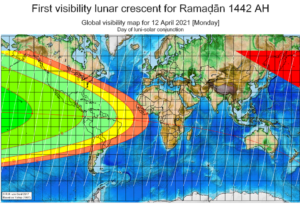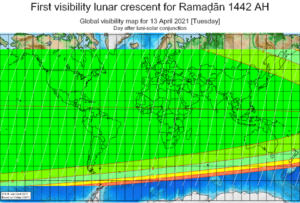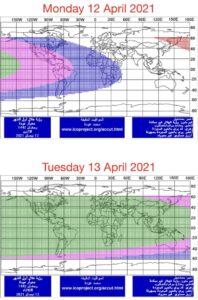Ramadan will start on or around the evening of April 13 and will be observed by hundreds of millions of Muslims worldwide.
This year Ramadan for most Muslims will be held under lockdown, bringing a new degree of challenge to the arduous but spiritually rewarding month.
As hundreds of millions of Muslims begin a month of no food or drink from dawn to dusk, it will be marked in a sombre manner given the many souls who did not live to see it this year.
Muslims around the world will celebrate the beginning of Ramadan by greeting each other with “Ramadan Mubarak” and “Ramadan Kareem”, meaning a blessed and generous month to you, respectively.
So when does Ramadan start?
The current year in the Islamic Hijri lunar calendar is 1442. Ramadan in 2021 is expected to start on the evening of Tuesday, April 13, subject to the sighting of the new moon.
Each year, Ramadan starts roughly ten days earlier because the lunar year is shorter than the solar year. In 2020, Ramadan began on April 23. In 2021, Ramadan will roughly begin around Monday April 13.
Because Ramadan begins at sunset, fasting would effectively start the next morning on April 14 2021.
Muslim lunar months last between 29 and 30 days and this largely depends on the sighting of the new full moon usually on the 29th day of each month. If a new moon is not visible, the month automatically lasts for 30 days.

How will Ramadan be different this year?
Precautions against the coronavirus will mean large public gatherings celebrating Ramadan will be off the menu. For millions around the world, the breaking of the fast is a communal event which this year will be limited to the closest of family relations.
Worshippers are advised to take necessary precautions, particularly given that stores will be crowded by shoppers buying ingredients for the end of fast meal between the end of work hours and sunset.

The month of Ramadan is also a period of intense spirituality, self-control and an opportunity to reconnect with God. The Muslim faithful, following their evening meal, will engage in special nighttime prayers known as taraweeh.
Mosques around the world have either been closed or attendance has been restricted in a bid to stop the spread of the deadly pandemic. Closures are likely to remain in place for the foreseeable future in the interests of public safety.
What is Ramadan?
Ramadan is the ninth month of the Islamic Hijri calendar. Like the Western Gregorian calendar, the Hijri calendar has 12 months, but unlike it, those months follow the lunar cycle, i.e. a new month begins with each new moon.
The term ‘Hijri’ stems from the Arabic word for ‘migration’ and represents the Prophet Muhammad’s move from the city of Mecca to the city of Medina.

Fasting during Ramadan is one of the five pillars of Islam, along with the Muslim declaration of faith, daily prayer, charity and performing the Hajj pilgrimage to Mecca.
Why do Muslims tend to start the month on different days
When Muslims first fasted, they largely inhabited the same location and relied on the naked eye to determine when the moon had been spotted. Information of a moon sighting did not have to travel vast distances as it does today.
As Islam gradually spread over the centuries it was no longer possible to determine the moon sighting in one place and also at the same time transmit to all Muslims globally.
Attempts to standardise the Islamic calendar is a process that was largely undertaken in the 20th Century with the onset of the nation-state.
The Ottomans, the last Islamic caliphate, did not have a standard fasting timetable within its vast lands, choosing instead to leave the process to local Islamic scholars. This was for centuries an uncontentious issue.
Some Muslim countries in recent times have decided to use telescopes in addition to mathematical calculations while others have maintained the age-old tradition of sighting the moon with the naked eye.
Some Muslims disagree on whether sighting the moon in one place should also be applicable in another whether via means of telescopes or otherwise.
As a result, some Muslims begin fasting on one day while others on a different day, however, for centuries this would have been normal.
Why is Ramadan so special to Muslims?
Muslims believe that the Angel Gabriel descended from heaven to reveal God’s message to the Prophet Muhammad (who Muslims honorifically add with the tile ‘peace be upon him’) during the month of Ramadan.
These revelations delivered verbally formed the foundational text of the Islamic faith, called the Koran, which Muslims hold to be an unaltered and final message from Allah.
Muslims believe that the night of the revelation is on one of the odd-numbered nights in the last 10 days of the month of Ramadan.
Many Muslims mark the occasion on the 27th night, which they call ‘Laylat ul Qadr’ or ‘The Night of Destiny’ with additional prayer.
Ramadan was later designated as the fasting month by the Prophet Muhammad after revelations in the Koran.
Who do Muslims generally turn to for the moonsighting?
The Saudi Supreme Council, a body composed of Islamic scholars, is one of the main institutions Muslims look to when learning whether there has been a moon sighting or not.
While other Muslim countries decide to practice the sighting for themselves such as Morocco, Turkey, Bangladesh and Nigeria.
The Nigerian Supreme Council of Islamic Affairs, NSCIA, for instance, has called on the Nigerian Muslims to look out for the crescent (moon) of Ramadan 1442AH from Monday, April 12, which is equivalent to the 29th day of Sha’aban 1442AH.
If the new moon of the month of Ramadan is sighted, fasting starts on Tuesday, April 13. If not, it will commence on Wednesday, the 14th of April, corresponding to the first day of Ramadan 1442 AH.
If the crescent is sighted by Muslims of impeccable character on the said evening, then the Sultan would declare Tuesday, 13 April 2021 as the first day of #Ramadan 1442 AH. If not sighted, then, Wednesday, 14 April 2021 automatically becomes the first of Ramadan, 1442 AH.
— NSCIA — Islamic Affairs (@NSCIAng) April 11, 2021
What does the word ‘Ramadan’ actually mean?
According to Muslim Matters, the word Ramadan stems from the ancient Arabic word ‘Ramdha’, which means the intense heat of the sun.
The article says that the months were named according to the seasons in which they fell, so Ramadan must originally have applied to a hot summer month.
However, depending on where you live, the pronunciation may differ; Ramadan, Ramzan, Ramazan, are all different ways of saying the same thing.
– With Additional information from TRT World



